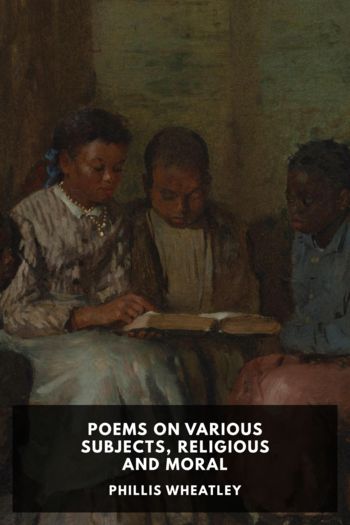The Autobiography of Benjamin Franklin - Benjamin Franklin (pocket ebook reader .txt) 📗

- Author: Benjamin Franklin
Book online «The Autobiography of Benjamin Franklin - Benjamin Franklin (pocket ebook reader .txt) 📗». Author Benjamin Franklin
Mr. Denham took a store in Water-street, where we opened our goods; I attended the business diligently, studied accounts, and grew, in a little time, expert at selling. We lodged and boarded together; he counselled me as a father, having a sincere regard for me. I respected and loved him, and we might have gone on together very happy; but, in the beginning of February, 1726/7, when I had just passed my twenty-first year, we both were taken ill. My distemper was a pleurisy, which very nearly carried me off. I suffered a good deal, gave up the point in my own mind, and was rather disappointed when I found myself recovering, regretting, in some degree, that I must now, some time or other, have all that disagreeable work to do over again. I forget what his distemper was; it held him a long time, and at length carried him off. He left me a small legacy in a nuncupative will, as a token of his kindness for me, and he left me once more to the wide world; for the store was taken into the care of his executors, and my employment under him ended.
My brother-in-law, Holmes, being now at Philadelphia, advised my return to my business; and Keimer tempted me, with an offer of large wages by the year, to come and take the management of his printing-house, that he might better attend his stationer’s shop. I had heard a bad character of him in London from his wife and her friends, and was not fond of having any more to do with him. I tried for farther employment as a merchant’s clerk; but, not readily meeting with any, I closed again with Keimer. I found in his house these hands: Hugh Meredith, a Welsh Pennsylvanian, thirty years of age, bred to country work; honest, sensible, had a great deal of solid observation, was something of a reader, but given to drink. Stephen Potts, a young countryman of full age, bred to the same, of uncommon natural parts, and great wit and humor, but a little idle. These he had agreed with at extreme low wages per week to be raised a shilling every three months, as they would deserve by improving in their business; and the expectation of these high wages, to come on hereafter, was what he had drawn them in with. Meredith was to work at press, Potts at bookbinding, which he, by agreement, was to teach them, though he knew neither one nor t’other. John ⸻, a wild Irishman, brought up to no business, whose service, for four years, Keimer had purchased from the captain of a ship; he, too, was to be made a pressman. George Webb, an Oxford scholar, whose time for four years he had likewise bought, intending him for a compositor, of whom more presently; and David Harry, a country boy, whom he had taken apprentice.
I soon perceived that the intention of engaging me at wages so much higher than he had been used to give, was, to have these raw, cheap hands formed through me; and, as soon as I had instructed them, then they being all articled to him, he should be able to do without me. I went on, however, very cheerfully, put his printing-house in order, which had been in great confusion, and brought his hands by degrees to mind their business and to do it better.
It was an odd thing to find an Oxford scholar in the situation of a bought servant. He was not more than eighteen years of age, and gave me this account of himself; that he was born in Gloucester, educated at a grammar-school there, had been distinguished among the scholars for some apparent superiority in performing his part, when they exhibited plays; belonged to the Witty Club there, and had written some pieces in prose and verse, which were printed in the Gloucester newspapers; thence he was sent to Oxford; where he continued about a year, but not well satisfied, wishing of all things to see London, and become a player. At length, receiving his quarterly allowance of fifteen guineas, instead of discharging his debts he walked out of town, hid his gown in a furze bush, and footed it to London, where, having no friend to advise him, he fell into bad company, soon spent his guineas, found no means of being introduced among the players, grew necessitous, pawned his clothes, and wanted bread. Walking the street very hungry, and not knowing what to do with himself, a crimp’s bill51 was put into his hand, offering immediate entertainment and encouragement to such as would bind themselves to serve in America. He went directly, signed the indentures, was put into the ship, and came over, never writing a line to acquaint his friends what was become of him. He was lively, witty, good-natured, and a pleasant companion, but idle, thoughtless, and imprudent to the last degree.
John, the Irishman, soon ran away; with the rest I began to live very agreeably, for they all respected me the more, as they found Keimer incapable of instructing them,





Comments (0)